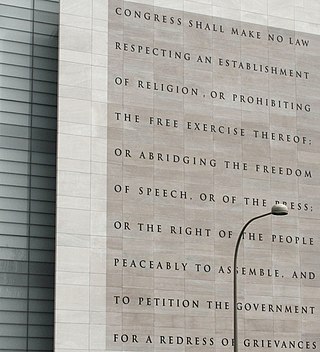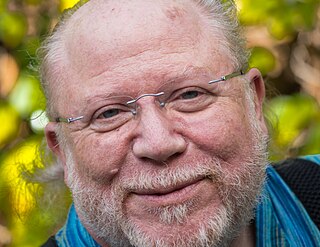Related Research Articles

The First Amendment to the United States Constitution prevents the government from making laws that: regulate an establishment of religion; prohibit the free exercise of religion; abridge the freedom of speech, the freedom of the press, the freedom of assembly, or the right to petition the government for redress of grievances. It was adopted on December 15, 1791, as one of the ten amendments that constitute the Bill of Rights.

The Newseum was an American museum at 555 Pennsylvania Avenue NW dedicated to news and journalism that promoted free expression and the First Amendment to the United States Constitution, while tracing the evolution of communication.
The Hugh M. Hefner First Amendment Award is an award created in honor of Playboy founder Hugh Hefner. The Hugh M. Hefner First Amendment Awards were established by Christie Hefner in 1979 to honor individuals who have made significant contributions in the vital effort to protect and enhance First Amendment rights for Americans. Since the inception of the awards, more than 100 individuals including high school students, lawyers, librarians, journalists and educators have been honored.
Academic freedom is the right of a teacher to instruct and the right a student to learn in an academic setting unhampered by outside interference. It may also include the right of academics to engage in social and political criticism.

In the United States, freedom of speech and expression is strongly protected from government restrictions by the First Amendment to the U.S. Constitution, many state constitutions, and state and federal laws. Freedom of speech, also called free speech, means the free and public expression of opinions without censorship, interference and restraint by the government. The term "freedom of speech" embedded in the First Amendment encompasses the decision what to say as well as what not to say. The Supreme Court of the United States has recognized several categories of speech that are given lesser or no protection by the First Amendment and has recognized that governments may enact reasonable time, place, or manner restrictions on speech. The First Amendment's constitutional right of free speech, which is applicable to state and local governments under the incorporation doctrine, prevents only government restrictions on speech, not restrictions imposed by private individuals or businesses unless they are acting on behalf of the government. However, It can be restricted by time, place and manner in limited circumstances. Some laws may restrict the ability of private businesses and individuals from restricting the speech of others, such as employment laws that restrict employers' ability to prevent employees from disclosing their salary to coworkers or attempting to organize a labor union.

Eric Newton is an American journalist, writer and media consultant.

The National Coalition Against Censorship (NCAC), founded in 1974, is an alliance of 50 American non-profit organizations, including literary, artistic, religious, educational, professional, labor, and civil liberties groups. NCAC is a New York–based organization with official 501(c)(3) status in the United States. The coalition seeks to defend freedom of thought, inquiry, and expression from censorship and threats of censorship through education and outreach, and direct advocacy. NCAC assists individuals, community groups, and institutions with strategies and resources for resisting censorship and creating a climate hospitable to free expression. It also encourages the publicizing of cases of censorship and has a place to report instances of censorship on the organization's website. Their annual fundraiser is called the Free Speech Defender Awards. The main goal of the organization is to defend the first amendment, freedom of thought, inquiry, and expression. NCAC's website contains reports of censorship incidents, analysis and discussion of free expression issues, a database of legal cases in the arts, an archive of NCAC's quarterly newsletter, a blog, and Censorpedia, a crowdsourced wiki. In fiscal year 2017, the organization earned a 95.93% rating by Charity Navigator, an organization that assesses the efficacy of nonprofits.
Rosenberger v. Rector and Visitors of the University of Virginia, 515 U.S. 819 (1995), was an opinion by the Supreme Court of the United States regarding whether a state university might, consistent with the First Amendment, withhold from student religious publications funding provided to similar secular student publications. The University of Virginia provided funding to every student organization that met funding-eligibility criteria, which Wide Awake, the student religious publication, fulfilled. The university's defense claimed that denying student activity funding to the religious magazine was necessary to avoid the University's violating the Establishment Clause of the First Amendment.

The Information Society Project (ISP) at Yale Law School is an intellectual center studying the implications of the Internet and new information technologies for law and society. The ISP was founded in 1997 by Jack Balkin, Knight Professor of Constitutional Law and the First Amendment at Yale Law School. Jack Balkin is the director of the ISP.
The 2021 census noted that Kazakhstan is 69.31% Muslim, 17.19% Christian, 11.25% other religious beliefs and 2.25% no religious belief.
The Freedom Forum is a nonpartisan 501(c)(3) foundation dedicated to fostering First Amendment freedoms for all. The organization advances First Amendment freedoms through programs that include Today's Front Pages, the Power Shift Project, the annual Al Neuharth Free Spirit and Journalism Conference for high school juniors, annual First Amendment Festival, Free Expression Awards and other conferences. Freedom Forum operated the Newseum in Washington, D.C. until 2019, when it sold the building to Johns Hopkins University.

Freedom of speech is a principle that supports the freedom of an individual or a community to articulate their opinions and ideas without fear of retaliation, censorship, or legal sanction. The right to freedom of expression has been recognised as a human right in the Universal Declaration of Human Rights and international human rights law by the United Nations. Many countries have constitutional law that protects free speech. Terms like free speech, freedom of speech, and freedom of expression are used interchangeably in political discourse. However, in a legal sense, the freedom of expression includes any activity of seeking, receiving, and imparting information or ideas, regardless of the medium used.
American Booksellers for Free Expression (ABFE) is the free speech initiative of the American Booksellers Association (ABA). ABFE is a non-profit organization whose mission is to protect and promote free expression in the United States. ABFE advises individuals who oppose book challenges and bans nationally and in local communities across the country. ABFE provides resources and education on the importance of free expression to booksellers, politicians, the press, and the public.

Cyber Rights: Defending Free Speech in the Digital Age is a non-fiction book about cyberlaw, written by free speech lawyer Mike Godwin. It was first published in 1998 by Times Books. It was republished in 2003 as a revised edition by The MIT Press. Godwin graduated from the University of Texas School of Law in 1990 and was the first staff counsel for the Electronic Frontier Foundation. Written with a first-person perspective, Cyber Rights offers a background in the legal issues and history pertaining to free speech on the Internet. It documents the author's experiences in defending free speech online, and puts forth the thesis that "the remedy for the abuse of free speech is more speech". Godwin emphasizes that decisions made about the expression of ideas on the Internet affect freedom of speech in other media as well, as granted by the First Amendment to the United States Constitution.

In May 2005, an unregistered editor posted a hoax article onto Wikipedia about journalist John Seigenthaler. The article falsely stated that Seigenthaler had been a suspect in the assassinations of U.S. President John F. Kennedy and U.S. Attorney General Robert F. Kennedy.

John Lawrence Seigenthaler was an American journalist, writer, and political figure. He was known as a prominent defender of First Amendment rights.
Intellectual freedom encompasses the freedom to hold, receive and disseminate ideas without restriction. Viewed as an integral component of a democratic society, intellectual freedom protects an individual's right to access, explore, consider, and express ideas and information as the basis for a self-governing, well-informed citizenry. Intellectual freedom comprises the bedrock for freedoms of expression, speech, and the press and relates to freedoms of information and the right to privacy.
The censorship of student media in the United States is the suppression of student-run news operations' free speech by school administrative bodies, typically state schools. This consists of schools using their authority to control the funding and distribution of publications, taking down articles, and preventing distribution. Some forms of student media censorship extend to expression not funded by or under the official auspices of the school system or college.

David Kaye is an American politician who served as the United Nations special rapporteur on the Promotion and Protection of the Right to Freedom of Opinion and Expression between August 2014 and July 2020. He was succeeded by Irene Khan. Kaye is clinical professor of law at the University of California, Irvine on public international law, international humanitarian law human rights and international criminal justice. He is co-director of the UCI Fair Elections and Free Speech Center working at the intersection of technology, freedom of speech and democratic deliberation. He is also the independent board chair of the Global Network Initiative.
Hazelwood School District et al. v. Kuhlmeier et al., 484 U.S. 260 (1988), was a landmark decision by the Supreme Court of the United States which held, in a 5–3 decision, that student speech in a school-sponsored student newspaper at a public highschool could be censored by school officials without a violation of First Amendment rights if the school's actions were "reasonably related" to a legitimate pedagogical concern.
References
- ↑ "First Amendment Center". The Free Speech Center. Retrieved February 2, 2024.